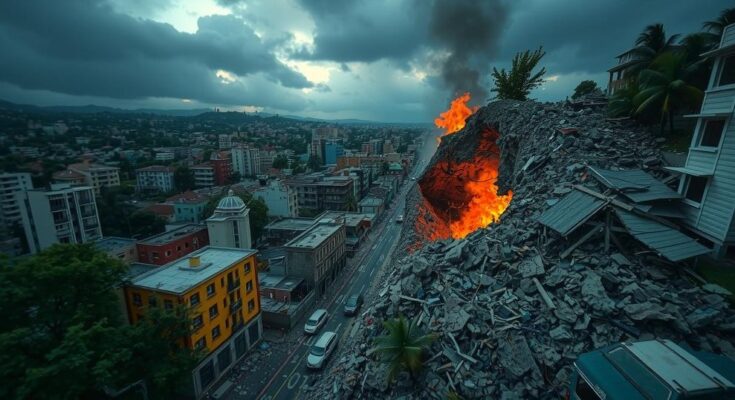An earthquake with a magnitude of 6.8 struck eastern Cuba, particularly impacting cities like Santiago de Cuba. This occurred in the wake of Hurricane Rafael, which caused widespread power outages and infrastructure damage. Initial reports indicate no major injuries or damages, but ongoing struggles with natural disasters and energy crises continue to affect the island’s residents.
On Sunday, eastern Cuba experienced a significant earthquake, registering a preliminary magnitude of 6.8. This seismic event occurred amidst ongoing crises, including hurricanes and widespread power outages, which have adversely affected numerous inhabitants on the island. According to the U.S. Geological Survey, the tremor’s epicenter was located approximately 25 miles south of Bartolome Maso, resonating throughout major urban areas such as Santiago de Cuba, Holguin, and Guantanamo. Notably, there were no immediate reports of severe structural damage or injuries within Cuba following the quake. Residents of Santiago, Cuba’s second-largest city, were particularly unsettled, with many taking to the streets in fear. Yolanda Tabío, 76, described the quake’s impact, stating that she experienced two aftershocks and observed people sitting nervously in doorways. “You had to see how everything was moving, the walls, everything,” she remarked. As the rumbling subsided, reports on social media indicated minor damages in Pilon, showcasing the continuing decay of older structures on the island. The earthquake follows a tumultuous period for Cuba, exacerbated by calamities such as Hurricane Rafael, which battered western regions earlier that week, knocking out power and compelling evacuations for hundreds of thousands. This was not an isolated incident: the island had already endured significant blackouts due to an ongoing energy crisis. Additionally, the population faced further turmoil in October, marked by power outages and hurricane destruction that resulted in fatalities. Amid such hardships, local discontent has given rise to small-scale protests across the nation.
Cuba is currently grappling with multiple crises, including recent natural disasters and a grave energy crisis leading to widespread power outages. The island has been affected by several hurricanes this season, with Hurricane Rafael bringing significant destruction just days prior to the earthquake. Historical challenges, such as aging infrastructure and insufficient disaster response measures, have compounded the impact of these disasters on Cuban residents, resulting in both physical damage and social unrest as citizens express their dissatisfaction with the government’s handling of these calamities.
In conclusion, the 6.8 magnitude earthquake represents yet another challenge for Cuba, which is already reeling from the aftermath of hurricanes and extensive blackouts. While initial reports indicate no major damage or injuries, the psychological effect on residents and the nation’s ongoing struggles underscore the need for comprehensive disaster preparedness and infrastructure improvements. This earthquake highlights how intertwined natural disasters are with social issues on the island, contributing to a growing wave of discontent among the populace.
Original Source: www.kxxv.com




